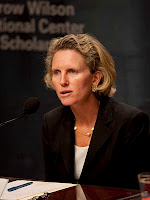Showing posts by Luke Hagberg.
-
Paradise Beneath Her Feet: How Women Are Transforming the Middle East
›Isobel Coleman, senior fellow for U.S. foreign policy at the Council on Foreign Relations, said she believes demographic changes are intensifying the notion that women’s empowerment is key to the growth and prosperity of the economies of Arab and Muslim-majority countries.
Coleman, author of the book Paradise Beneath Her Feet: How Women Are Transforming the Middle East, spoke at the Wilson Center in October, with Haleh Esfandiari moderating.
In addition to the Middle East’s demographics, Coleman also discussed how women in these traditional societies face challenges expanding their roles because women’s rights are often seen in a negative light. Coleman noted that things are changing, however, because women in the Muslim world are turning towards an Islamic discourse, which allows them to expand their rights within society’s religious framework. With this tactical shift and gradual gains in education, Coleman explained how women are slowly yet steadily transforming their societies.
Coleman began her talk by focusing on the demographic changes in the region, noting that 50 percent of the Arab world’s population is under the age of 22. Furthermore, education was once the exclusive preserve of men in many Arab and Muslim states (in some cases, only decades ago). Today, however, women often constitute the majority of those enrolled in these countries’ educational institutions: Females outnumber males in Jordan’s secondary schools and constitute 70 percent of all university students in Iran. While the levels of educational attainment and achievement among women are increasing, normative and legal restrictions on their socioeconomic mobility remain. Coleman indicated that this contradictory scenario has led to greater opposition to impediments to women’s equality.
Coleman went on to address the tactics being used by the latest generation of reform-minded women in the Muslim world. She said today’s reformist women are more cognizant of the religious conservatism in their societies and are taking on religion in a way earlier feminists did not. By making feminist arguments from an Islamic perspective they avoid being “slandered” by conservatives and traditionalists as pro-Western or anti-Islamic. Coleman noted that some women adopt such a stance out of deep religious conviction, while others do it in the name of expediency. She indicated this new strategy of compromise has given more women influence in social affairs and led to significant engagement with governments.
With the advent of new social media and technology, women have become more visible and able to express their opinions about previously taboo gender-related issues. Female journalists and bloggers are more stridently supporting feminist discourses. Coleman mentioned Sweet Talk, the Arabic language equivalent of the American television show, The View, on which the female co-hosts have addressed topics such as polygamy, rape, incest, and the Saudi prohibition on women driving.
According to Coleman, these factors of change – demographic transitions, the role of media, and an awareness of growing extremism in society – are contributing to women making strides in the region and a “wearing away” of gender inequality in the Muslim world. Given the gains women have made so far, Coleman said she is “cautiously optimistic” for the future.
Luke Hagberg is an intern with the Middle East Program at the Wilson Center; Haleh Esfandiari is the director of the Middle East Program.
Photo Credit: Yemeni women in computer class, courtesy of flickr user World Bank Photo Collection, and David Hawxhurt/Wilson Center. -
Demography and Women’s Empowerment: Urgency for Action?
›Why do Middle Eastern women participate in economic life at a rate lower than that of female citizens of other regions? According to Nadereh Chamlou, a senior advisor at the World Bank, restrictive social norms are to blame. At the Middle East and Environmental Change and Security Programs’ “Demography and Women’s Empowerment: Urgency for Action?” event, Chamlou argued that the region’s women must be empowered to participate in a more significant way if their countries are to effectively exploit, instead of squander, the current economic “window of opportunity.”According to Chamlou, the region is facing a “demographic window of opportunity” where its relatively high numbers of working-age people create the potential for rapid economic growth. However, Middle Eastern countries also have the highest dependency rates in the world. Without opening more economic opportunities for women, the region’s demographic window of opportunity will not be exploited to its full advantage.
Chamlou disputed the commonly held assumptions regarding the historic lack of female participation in the Middle East’s economic sphere, such as the belief that women abstain from joining the workforce because they do not possess the necessary education and skills. She cited statistics showing that the region’s women are represented at a near-equal level as men in secondary school, and to an even greater degree at the university level. They are also studying in marketable fields, disproving the theory that they are not acquiring employable skills.
A survey conducted by the World Bank in three Middle Eastern capital cities — Amman, Jordan; Cairo, Egypt; and Sana’a, Yemen — showed that negative male attitudes regarding women working outside the home were the most significant reason for poor female representation in the workforce. Notably, negative male attitudes restricted women’s participation far more than child-rearing duties. Despite the successful efforts of most Middle Eastern states to improve female education, conservative social norms that pose a barrier to female empowerment remain in place.
Chamlou concluded her remarks with three policy recommendations: 1) Focus on medium-educated, middle-class women; 2) Undertake more efforts to bring married women into the workforce; and 3) Place a greater emphasis on changing attitudes, particularly among conservative younger men, towards women working outside the home. Such changes could more effectively utilize the Middle East’s demographic window of opportunity.
Luke Hagberg is an intern and Haleh Esfandiari is director of the Middle East Program at the Wilson Center.
Sources: Population Reference Bureau.
Photo Credit: Adapted from “Obey Stikman,” courtesy of flickr user sabeth718.






